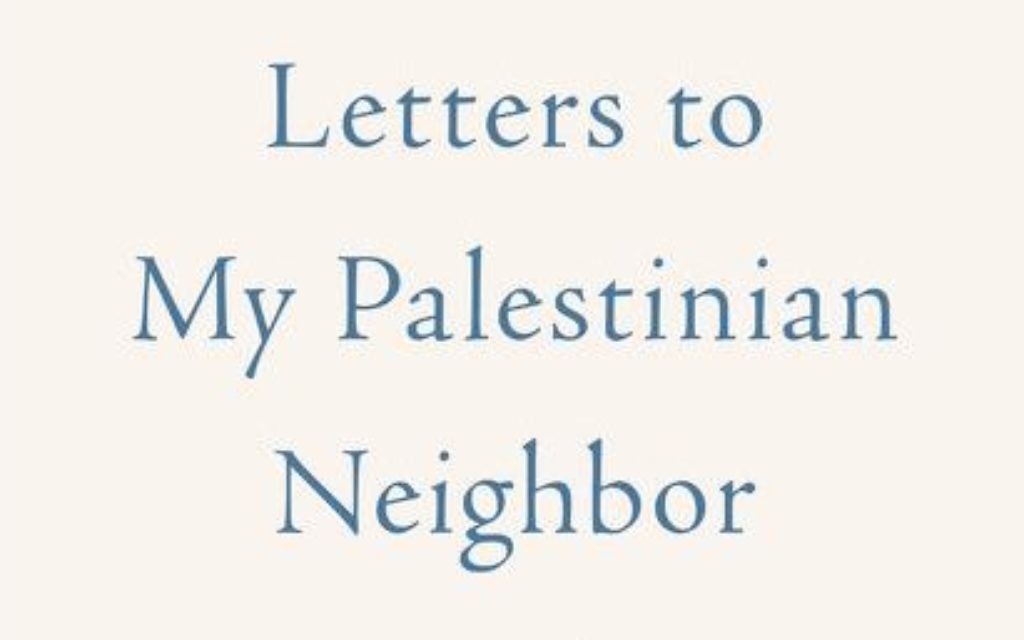Israeli Makes 200-Page Effort to Bridge Divides
Yossi Klein Halevi's "Letters" seeks a shared acknowledgment of both sides' narratives in the Holy Land.
“Letters to My Palestinian Neighbor” is Yossi Klein Halevi’s invitation to an unseen reader in the village he can see and hear from his home in the French Hill neighborhood of Jerusalem.
Halevi, a senior fellow at the Shalom Hartman Institute in Jerusalem, shares “why being Jewish and Israeli is so important to me, why I draw so much strength from the intensity of those commitments,” in the hope that his neighbor will respond in a similarly personal vein.
To spur such dialogue, an Arabic translation of “Letters,” published by HarperCollins, is available free online.
Get The AJT Newsletter by email and never miss our top stories Free Sign Up
I read widely on Israel (albeit in English), and Halevi is among the journalists I find most insightful, particularly about the relationship between Israel and American Jews. (Disclosure: We were, briefly, classmates in journalism graduate school.)
In his previous books, Halevi, who made aliyah in 1982, has written about his youth in New York (“Memoirs of a Jewish Extremist”), his journey into the faith lived by Palestinian Christians and Muslims (“At the Entrance to the Garden of Eden”) and the later lives of Israeli soldiers who fought in the 1967 war (“Like Dreamers”).
A religiously observant and spiritual Jew, Halevi separates that which he regards as being in G-d’s hands from that which can be influenced by men and women of flesh.
“I call you ‘neighbor,’” he begins “Letters,” “because I don’t know your name or anything personal about you. Given our circumstances, ‘neighbor’ may be too casual a word to describe our relationship. We are intruders in each other’s dreams, violators of each other’s sense of home. We are living incarnations of each other’s worst historical nightmares. Neighbors?”
Throughout the book’s 200 pages, Halevi states his case for the necessity and legitimacy of the modern state of Israel while appealing to Israeli Jews and Palestinians to respect each other’s narrative.
“To solve our conflict, we must recognize not only each other’s right to self-determination but also each side’s right to self-definition,” he says.
 “What I need from you is respect for my people’s story. The campaign against our connection to this land and its holy sites tells Jews that our conflict isn’t about occupation or settlements but is, instead, a war against Jewish history. The attempt to erase us conceptually, many Jews fear, is a first step toward erasing us physically,” he writes.
“What I need from you is respect for my people’s story. The campaign against our connection to this land and its holy sites tells Jews that our conflict isn’t about occupation or settlements but is, instead, a war against Jewish history. The attempt to erase us conceptually, many Jews fear, is a first step toward erasing us physically,” he writes.
“Tragically,” Halevi acknowledges, “each side has tried, at different stages of the conflict, to deny the legitimacy of the other’s national identity, to rationalize the other out of existence.”
Halevi explains his hope for a negotiated two-state solution this way: “I long ago realized that the historic claims and religious longings that connect me to this land cannot justify my possession of all of it at another people’s expense. And so, however painfully, I accept partition as a practical expression of resolving a conflict between two legitimate claims.”
His caveat is that “the trade-off will be peace, and not greater terror. … Ensuring the security of Israel — and not implementing historical claims — is the most important measure for deciding the fate of the territories,” which Halevi calls by their biblical names, Judea and Samaria.
However daunting the divide between his Jewish neighbors and the Palestinians across the valley from his home, Halevi finds value in this modest step.
“So far whatever has been tried between us has failed miserably and has brought death and destruction to both sides. Let’s start talking and see what happens. And so, neighbor, here I am. I invite you into my spiritual home, in the hope that one day we will be able to welcome each other into our physical homes,” he writes at the conclusion of the first letter, “The Wall Between Us.”
“Letters to My Palestinian Neighbor” may not be addressed to American Jews, but, Halevi messaged in response to my asking, “I hope the book will challenge Jews on the right with the need for empathy for the Palestinians, and challenge Jews on the left with the need to affirm our story.”





comments